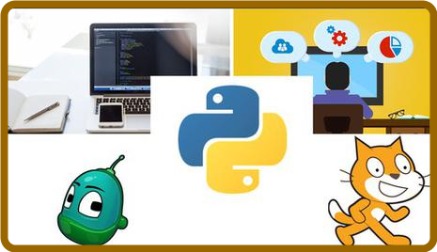
Coding Masterclass - Learn Great Coding
Posted on 15 Apr 04:24 | by LeeAndro | 30 views

Published 04/2022MP4 | Video: h264, 1280x720 | Audio: AAC, 44.1 KHz, 2 ChGenre: eLearning | Language: English + srt | Duration: 14 lectures (1h 56m) | Size: 1.22 GB
You will learn how to create programs, make games and solve programming problems.
Understand all the fundamental programming principles.
Understand complex programming topics.
Learn to use coding to develop games!
You will not need any any prior knowledge - so get started now!
You should be committed to run through the course and become knowledgeable about the magic world of coding.
Nothing else! It's just you, your computer and your hunger to get started today!
* THIS COURSE COVERS GAME DEVELOPMENT IN SCRATCH 3.0, KODU AND CODING PRINCIPLES TO FILL THE GAP BETWEEN SCRATCH 3.0 AND REAL CODING *
In this course you will be able to develop games in Scratch 3.0 programming language and 3D games in Kodu Game Lab. For the development of these games, is used Scratch 3.0 and Kodu Game Lab because they are educational programming environments that have an easy graphical interface that it will allow us to drag and drop the right blocks of coding.
I promise you that it will be a funny and exciting course that it will motivate you to learn coding in more depth.
Scratch 3.0 is a free programming language and online community where you can create your own interactive stories, games, and animations. Using Scratch, users can create online projects and develop them into almost anything by using a simple block-like interface. When they are ready, they then share, and also discuss their creations with each other. Scratch 3.0 was developed by the Lifelong Kindergarten group at the MIT Media Lab. Scratch 3.0 is designed to help children (ages 8 and up) learn to utilize their imaginations, practice common sense, and, most importantly, to interact with computers.
From Game Development with Scratch and Kodu Game Lab to Real coding with Python
Block #1: Basic Concepts
Objectives covered by the block
fundamental concepts: interpreting and the interpreter, compilation and the compiler, language elements, lexis, syntax and semantics, Python keywords, instructions, indenting
literals: Boolean, integer, floating-point numbers, scientific notation, strings
comments
the print function
the input function
numeral systems (binary, octal, decimal, hexadecimal)
numeric operators: * / % // + –
string operators: * +
assignments and shortcut operators
Block #2: Data Types, Evaluations, and Basic I/O Operations
Objectives covered by the block
operators: unary and binary, priorities and binding
bitwise operators: ~ & ^ |
Boolean operators: not and or
Boolean expressions
relational operators ( != > >=
accuracy of floating-point numbers
basic input and output operations using the input, print, int, float, str, len functions
formatting print output with end= and sep= arguments
type casting
basic calculations
simple strings: constructing, assigning, indexing, immutability
Block #3: Flow Control – loops and conditional blocks
Objectives covered by the block
conditional statements: if, if-else, if-elif, if-elif-else
multiple conditional statements
the pass instruction
building loops: while, for, range, in
iterating through sequences
expanding loops: while-else, for-else
nesting loops and conditional statements
controlling loop execution: break, continue
Block #4: Data Collections – Lists, Tuples, and Dictionaries
Objectives covered by the block (7 items)
simple lists: constructing vectors, indexing and slicing, the len function
lists in detail: indexing, slicing, basic methods (append, insert, index) and functions (len, sorted, etc.), del instruction, iterating lists with the for loop, initializing, in and not in operators, list comprehension, copying and cloning
lists in lists: matrices and cubes
tuples: indexing, slicing, building, immutability
tuples vs. lists: similarities and differences, lists inside tuples and tuples inside lists
dictionaries: building, indexing, adding and removing keys, iterating through dictionaries as well as their keys and values, checking key existence, keys, items and values methods
strings in detail: escaping using the \ character, quotes and apostrophes inside strings, multiline strings, basic string functions.
Block #5: Functions (20%)
Objectives covered by the block (6 items)
defining and invoking your own functions and generators
return and yield keywords, returning results,
the None keyword,
recursion
parameters vs. arguments,
positional keyword and mixed argument passing,
default parameter values
converting generator objects into lists using the list function
name scopes, name hiding (shadowing), the global keyword
So What Are You Waiting For
Enroll Today!
Anyone who wants to learn to code easily by creating a game.
Bners who have never programmed before in Scratch.
Students that want to learn difficult programming concepts by having fun using their creativity.
DOWNLOAD
uploadgig.com
https://uploadgig.com/file/download/75e809ae8Ea8e130/Coding_Masterclass__.part1.rar
https://uploadgig.com/file/download/7bdCfe00b2259663/Coding_Masterclass__.part2.rar
rapidgator.net
https://rapidgator.net/file/4a0f905faa44277233860f3432876ffa/Coding_Masterclass__.part1.rar.html
https://rapidgator.net/file/e0a18162b69d40b905f7b3c4128cd256/Coding_Masterclass__.part2.rar.html
nitro.download
https://nitro.download/view/0DE0434EC576399/Coding_Masterclass__.part1.rar
https://nitro.download/view/03E7D10C561C67C/Coding_Masterclass__.part2.rar
Related News
System Comment
Information
 Users of Visitor are not allowed to comment this publication.
Users of Visitor are not allowed to comment this publication.
Facebook Comment
Member Area
Top News



